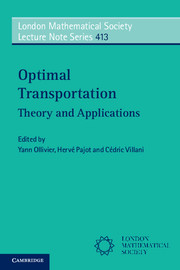Book contents
- Frontmatter
- Contents
- List of contributors
- Preface
- PART 1 SHORT COURSES
- 1 Introduction to optimal transport theory
- 2 Models and applications of optimal transport in economics, traffic, and urban planning
- 3 Logarithmic Sobolev inequality for diffusion semigroups
- 4 Lecture notes on variational models for incompressible Euler equations
- 5 Ricci flow: the foundations via optimal transportation
- 6 Lecture notes on gradient flows and optimal transport
- 7 Ricci curvature, entropy, and optimal transport
- PART 2 SURVEYS AND RESEARCH PAPERS
- References
3 - Logarithmic Sobolev inequality for diffusion semigroups
from PART 1 - SHORT COURSES
Published online by Cambridge University Press: 05 August 2014
- Frontmatter
- Contents
- List of contributors
- Preface
- PART 1 SHORT COURSES
- 1 Introduction to optimal transport theory
- 2 Models and applications of optimal transport in economics, traffic, and urban planning
- 3 Logarithmic Sobolev inequality for diffusion semigroups
- 4 Lecture notes on variational models for incompressible Euler equations
- 5 Ricci flow: the foundations via optimal transportation
- 6 Lecture notes on gradient flows and optimal transport
- 7 Ricci curvature, entropy, and optimal transport
- PART 2 SURVEYS AND RESEARCH PAPERS
- References
Summary
Abstract
Through the main example of the Ornstein–Uhlenbeck semigroup, the Bakry–Emery criterion is presented as a main tool to get functional inequalities as Poincaré or logarithmic Sobolev inequalities. Moreover, an alternative method using the optimal mass transportation is also given to obtain the logarithmic Sobolev inequality.
Introduction
The goal of this course (given in 2009 in Grenoble) is to introduce inequalities as Poincaré or logarithmic Sobolev for diffusion semigroups. We will focus more on examples than on the general theory. A main tool to obtain those inequalities is the so-called Bakry–Emery Γ2-criterion. This criterion is well known to prove such inequalities and has also been used many times for other problems; see, for instance, [BÉ85, Bak06]. We will focus on the example of the Ornstein–Uhlenbeck semigroup and on the Γ2-criterion.
In Section 3.2 we investigate the main example of the Ornstein–Uhlenbeck semigroup, whereas in Section 3.3 we show how the Γ2-criterion implies such inequalities. In Section 3.4 we will explain an alternative method to get a logarithmic Sobolev inequality under curvature assumption. It is called the mass transportation method and has been introduced recently; see [CE02, OV00, CENV04, Vil09]. In this way we will also obtain another inequality called the Talagrand inequality or T2inequality.
The Ornstein–Uhlenbeck semigroup and the Gaussian measure
In the general setting, if (Xt)t≥0 is a Markov process on ℝn, then the family of operators
Pt(f)(x) = E(f (Xt)),
where X0 = x and a smooth function f, is defined as a Markov semigroup on ℝn. There are two main examples. The first one is the heat semigroup, which is associated with the Brownian motion on ℝn.
- Type
- Chapter
- Information
- Optimal TransportTheory and Applications, pp. 41 - 57Publisher: Cambridge University PressPrint publication year: 2014
References
- 1
- Cited by

